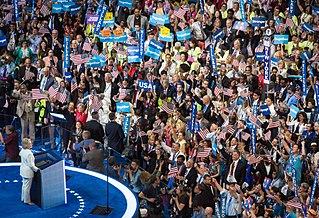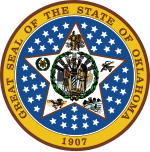
The Democratic National Convention (DNC) is a series of presidential nominating conventions held every four years since 1832 by the United States Democratic Party. They have been administered by the Democratic National Committee since the 1852 national convention. The primary goal of the Democratic National Convention is to officially nominate a candidate for president and vice president, adopt a comprehensive party platform, and unify the party. Pledged delegates from all fifty U.S. states, the District of Columbia, and the American territories, and superdelegates which are unpledged delegates representing the Democratic establishment, attend the convention and cast their votes to choose the party's presidential candidate. Like the Republican National Convention, the Democratic National Convention marks the formal end of the primary election period and the start of the general election season. Since the 1980s, national conventions have become mostly inaugural events for the winning candidate, since winners are announced long before the convention. In 2020, both major parties, and many minor parties, replaced their usual in-person conventions with virtual programs due to the COVID-19 pandemic.
In American politics, a superdelegate is a delegate to a presidential nominating convention who is seated automatically.

From January 3 to June 3, 2008, voters of the Democratic Party chose their nominee for president in the 2008 United States presidential election. Senator Barack Obama of Illinois was selected as the nominee, becoming the first African American to secure the presidential nomination of any major political party in the United States. However, due to a close race between Obama and Senator Hillary Clinton of New York, the contest remained competitive for longer than expected; neither candidate received enough pledged delegates from state primaries and caucuses to achieve a majority, without endorsements from unpledged delegates (superdelegates).

The 2008 Iowa Democratic presidential caucus occurred on January 3, and was the state caucuses of the Iowa Democratic Party. It was the first election for the Democrats of the 2008 presidential election. Also referred to as "the First in the Nation Caucus," it was the first election of the primary season on both the Democratic and Republican sides. Of the eight major Democratic presidential candidates, then-U.S. Senator Barack Obama of Illinois received the most votes and was ultimately declared the winner of the Iowa Democratic Caucus of 2008, making him the first African American to win the caucus and the first African American to win a primary state since Jesse Jackson in 1988. Former U.S. Senator John Edwards of North Carolina came in second place and then-U.S. Senator Hillary Clinton of New York finished third, though Clinton received more delegates than Edwards. Campaigning had begun as early as two years before the event.

The 2008 United States presidential election in Iowa took place on November 4, 2008, as part of the 2008 United States presidential election. Voters chose seven representatives, or electors to the Electoral College, who voted for president and vice president.

The 2008 New Hampshire Democratic presidential primary on January 8, 2008 was the first primary in the United States in 2008. Its purpose was to determine the number of delegates from New Hampshire that would represent a certain candidate at the National Convention. In a primary, members of a political party—in this case, the Democratic Party—will select the candidates to a subsequent election. Since 1920, New Hampshire has always hosted the first primaries in the entire nation. The Democratic Party's primary occurred on the same day as the Republican primary.

The 2008 Minnesota Democratic presidential caucuses took place on Super Tuesday, February 5, 2008 with 78 delegates at stake. The winner in each of Minnesota's eight congressional districts was awarded all of that district's delegates, totaling 47. Another 25 delegates were awarded to the statewide winner, Barack Obama. The 72 delegates represented Minnesota at the Democratic National Convention in Denver, Colorado. Sixteen other unpledged delegates, known as superdelegates, also attended the convention and cast their votes as well.

The 2008 Ohio Democratic presidential primary took place on March 4, 2008 and was open to anyone requesting a Democratic party ballot. In 2008, any registered Ohio voter could on election day request a primary ballot of either the Democratic or Republican party, by signing an affidavit stating that they supported the principles of the party whose ballot they are obtaining.

The 2008 Rhode Island Democratic presidential primary took place on March 4, 2008. It was an open primary. 21 delegates were awarded on a proportional basis. Rhode Island's delegation to the 2008 Democratic National Convention also included 11 superdelegates whose votes were not bound by the results of the primary election. Hillary Clinton won the primary.

The 2008 Vermont Democratic presidential primary was an open primary that took place on March 4, 2008. Barack Obama won the primary, his only decisive win among the four March 4 contests. The primary determined the 15 pledged delegates that represented Vermont at the 2008 Democratic National Convention. The delegates were awarded to the candidates, Obama and Hillary Clinton, on a proportional basis. Vermont also sent 8 unpledged "superdelegates", to the convention not bound by the results of the primary.

The 2008 Texas Democratic presidential primary and caucuses were a series of events to determine the delegates that the Texas Democratic Party sent to the 2008 Democratic National Convention. Delegates were selected using results from two sources: the Texas Presidential Primary held on March 4 by the Secretary of State of Texas's office, and a series of caucus events held between March 4 and June 7 by the Texas Democratic Party. The indecisive results of Super Tuesday, and the fact that Texas had the largest number of delegates among the states remaining on the Democratic primary calendar, resulted in the Texas primary receiving significant attention from both the Hillary Clinton and Barack Obama campaigns.

The 2008 Pennsylvania Democratic presidential primary was held on April 22 by the Pennsylvania Department of State in which voters chose their preference for the Democratic Party's candidate for the 2008 United States presidential election. Voters also chose the Pennsylvania Democratic Party's candidates for various state and local offices. The selected candidates were placed on the ballot of the 2008 general election on November 4. The Democratic primary was part of a general primary that also included the 2008 Pennsylvania Republican presidential primary.

The 2008 West Virginia Democratic presidential primary took place on May 13, 2008 with polls closing at 7:30 p.m. EST. It was open to Democrats and Independents. The primary determined 28 delegates to the 2008 Democratic National Convention, who were awarded on a proportional basis. West Virginia's Democratic delegation also included 11 unpledged "superdelegates". The primary came late in the nomination race. Hillary Clinton won by a very wide margin, but her opponent Barack Obama maintained a substantial lead in the overall number of pledged delegate votes. Despite Clinton's landslide win in this primary she would receive more votes in this primary than in the 2016 United States presidential election in West Virginia as the Democratic nominee.

The 2008 Oregon Democratic presidential primary was a mail-only primary in the U.S. state of Oregon. Ballots were mailed to registered Democratic voters between May 2 and May 6, 2008. To be counted, all ballots had to have been received by county elections offices by 8:00 p.m. PDT on May 20, 2008. It was a closed primary and voters had to have registered as Democrats by April 29, 2008 to be eligible to vote in any of the partisan races. Barack Obama won the presidential primary with 58% of the vote.

The 2008 United States presidential election in New Hampshire took place on November 4, 2008, as part of the 2008 United States presidential election throughout all 50 states and the District of Columbia. Voters chose four representatives, or electors to the Electoral College, who voted for president and vice president.

The 2016 Wyoming Democratic presidential caucuses were held on April 9 in the U.S. state of Wyoming, representing the first tier of the Wyoming Democratic Party's nomination contest for the 2016 presidential election. Only registered Democrats were allowed to participate in the closed precinct caucuses.

The 2020 Alabama Democratic presidential primary took place on March 3, 2020, as one of 15 contests scheduled on Super Tuesday in the Democratic Party primaries for the 2020 presidential election. The open primary allocated 52 pledged delegates towards the 2020 Democratic National Convention, distributed in proportion to the results of the primary, statewide and within each congressional district. The state was also given an additional 8 unpledged delegates (superdelegates), whose votes at the convention were not bound to the result of the primary.

The 2012 Oklahoma Democratic presidential primary took place on Tuesday, March 6, 2012, as part of Super Tuesday along with other primaries and caucuses. Oklahoma's 45 pledged delegates to the Democratic National Convention were allocated according to the results of the vote.

The 2012 West Virginia Democratic presidential primary was held on May 8, 2012 as part of the 2012 Democratic presidential primaries.

The 2000 Alabama Democratic presidential primary took place on June 6, 2000, as one of five final contests scheduled in the Democratic Party primaries for the 2000 presidential election. The open primary allocated 54 pledged delegates towards the 2000 Democratic National Convention, distributed in proportion to the results of the primary, statewide and within each congressional district. The state was also given an additional 10 unpledged delegates (superdelegates), whose votes at the convention were not bound to the result of the primary.


















